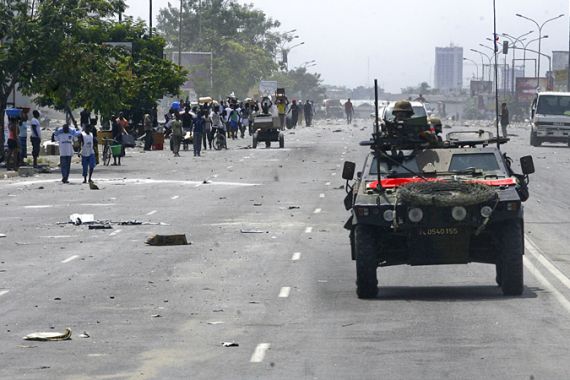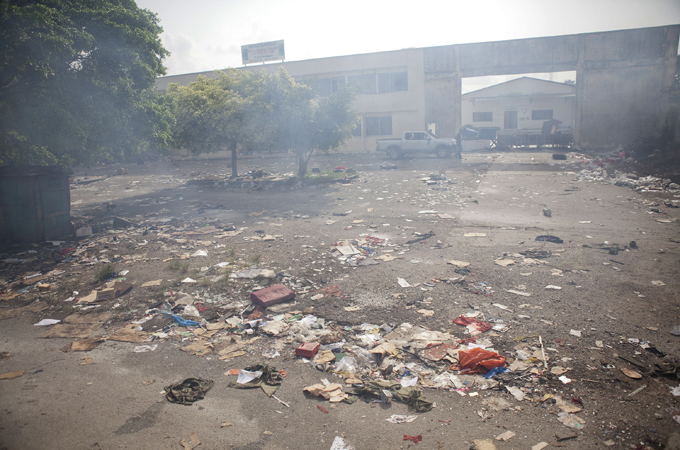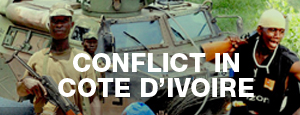Gbagbo’s troops regain ground in Abidjan
UN peacekeeping chief says Ivorian presidential election loser used negotiations as a ‘trick’ in fight to hold power.

 |
| Al Jazeera’s correspondent described Abidjan, the country’s largest city, as a “ghost town” following the clashes [EPA] |
Forces loyal to Laurent Gbagbo, Cote d’Ivoire’s incumbent president who the international community says lost a November presidential election, have regained ground in Abidjan and fully control the upscale Plateau and Cocody areas, UN peacekeeping chief Alain Le Roy has said.
Le Roy said that Gbagbo’s forces, under attack by those of internationally recognised President Alassane Ouattara, had used a lull for peace talks that began on Tuesday as a “trick” to reinforce their positions. They still had heavy weapons, though UN and French forces had destroyed some of them, Le Roy told reporters after briefing the UN Security Council.
| The battle for Abidjan |
|
|
“We have seen heavy weapons to be transferred to the Cocody area, including this morning,” he said on Friday, referring to photographs of M-21 rocket launchers, rocket-propelled grenade launchers and armoured personnel carriers.
Toussaint Alain, a Gbagbo spokesman, denied that forces loyal to him had access to heavy weapons.
Gbagbo forces were just one kilometre from the Ouattara’s headquarters at the Golf Hotel, Le Roy said.
Al Jazeera’s Haru Mutasa, reporting from Abidjan, said she had heard gunfire and helicopters from the direction of Cocody throughout the day on Friday, but that on Saturday morning, things were “relatively calm”.
“What we’re seeing is the UN and French military patrolling the streets … It is relatively calm Saturday morning and people here have gone into some kind of pattern. We’re being told that in the morning hours, they venture out onto the street, some of them, to try and find food and water, but at midday, they’ve learnt that around about that time they start hearing gunfire, and they head home,” she reported.
The Constitutional Council declared Gbagbo the winner of the November 28 presidential election after nullifying earlier results that showed Ouattara emerging with the most votes. The international community, including the United Nations, however, has recognised Ouattara as the legally elected president and is working to oust Gbagbo.
UN, rights watchdog voice concern
The fighting between the two sides has raged throughout Cote d’Ivoire and in Abidjan, the country’s commercial capital, where both Gbagbo and Ouattara currently reside – Gbagbo in presidential palace, Ouattara in the posh but heavily guarded hotel.
Reports of extreme violence have emerged in recent days. The Catholic charity Caritas on Sunday said that more than 1,000 civilians had been killed in the town of Duekoue and blamed Ouattara’s troops for the violence. Since Friday, UN forces have found more than 100 bodies in several towns – some burned alive and others thrown down wells.
Navi Pillay, the UN human rights commissioner, termed the reports she was receiving from UN teams in the country as being “utterly horrifying”, saying in a statement that the situation in Abidjan was “appalling”, and that due to the security situation the UN had still not been able to fully assess the extent of alleged violations.
Human Rights Watch, the New York-based rights watchdog, accused both Ouattara’s and Gbagbo’s forces of killing rivals and specifically accused Ouattara’s forces of killing or raping hundreds of people and burning villages during an offensive in late March.
“To understand the tragic events in Ivory Coast, a line cannot be drawn between north and south, or supporters of Gbagbo and Ouattara,” said Daniel Bekele, HRW’s Africa director.
The UN says much of the violence appears to be ethnically motivated.
Call to arms
In Abidjan, Gbagbo has remained defiant in the face of increasing pressure. French and UN helicopters have attacked his presidential residence, where Gbagbo is staying with his wife.
 |
| Click here for more special coverage |
His RTI television also came back on air Friday and broadcast an appeal for support.
“The regime of Gbagbo is still in place, a strong mobilisation is required by the population,” it said.
Al Jazeera’s Mutasa reported Gbagbo was looking to exploit Ivorian scepticism regarding the reasons for military intervention in the country.
“One thing that Gbagbo is pushing … [is] this agenda that Ouattara seems to be backed by the UN and France … what has he promised France ‘in return’ for him gaining the presidency? So people are sceptical about this, Gbagbo is using it to his advantage,” she said.
Gbagbo is believed to be defended by a force of around 1,000 presidential guard troops and youth militiamen, while the UN peacekeeping mission in Cote d’Ivoire has about 12,000 troops.
Meanwhile, in Washington DC, Hillary Clinton, the US secretary of state, and Ban Ki-moon, the UN secretary-general, issued an alert on a potential humanitarian crisis and denouced attacks on UN peacekeepers.
The World Food Programme and UN relief agencies have appealed for humanitarian corridors to be set up in order to ensure safe access to fleeing civilian and to ease aid deliveries from Liberia and Ghana.
EU hopes to lift sanctions
Despite Ouattara’s international recognition, he has lost some goodwill after some of the recent civilian killings were blamed on his men.
Aid workers estimate 1 million people have been displaced by the fighting and some 150,000 people have fled the country.
In a nationally televised speech on Thursday, Ouattara promised that he would co-operate with international inquiries into human rights abuses and punish those found guilty.
He asked the European Union to remove sanctions on the ports of Abidjan and San Pedro and “certain public entities” in order to restore the country’s lucrative cocoa trade.
Ouattara also asked the Central Bank to reopen its branches and pay salaries and arrears as soon as possible, moves that could help return the country to greater normalcy and win Ouattara some public goodwill.
A spokesman for Catherine Ashton, the EU foreign affairs chief, said the union hoped to begin easing the sanctions soon.